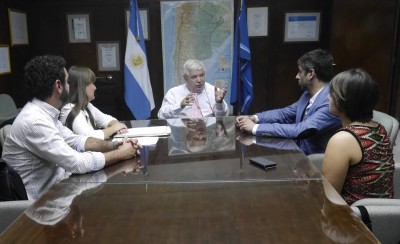Unmerited patent challenged from three continents
Organizations of people with hepatitis C are challenging a patent application that, if successful, would prevent 800,000 people having access to treatment in Argentina. Fundación Grupo Efecto Positivo (FGEP) leads the movement of organizations challenging pharmaceutical patents, as a key strategy to ensure access to medicines. The growing global movement to guarantee access to medicines for people with hepatitis C and fight Gilead’s abuse of the patent system is running on three continents.

Meeting between FGEP and the President of the National Institute of Industrial Property
FGEP and the Argentinian Network of Positive People (Redar Positiva) together in joint efforts with Initiative from Medicines, Access & Knowledge (I-MAK), introduced a wake-up call to Argentina’s Patent Office to reject the patent requested by GILEAD and Pharmasset Laboratories, LLC on the prodrug of an essential medicine to treat people with hepatitis C.
According to FGEP, the pharmaceutical company Gilead is looking to illegally patent the drug, preventing approximately 800,000 people to get the treatment they need. This coordinated effort has huge impact on the global movement to combat the Hepatitis C epidemic that causes 700,000 deaths worldwide each year.
“With this patent opposition we want to make sure that Gilead will not use unjustified patents to charge exorbitant prices for the treatment of Hepatitis C, also preventing us from getting generic versions,” Explained Lorena Di Giano, Executive Director of FGEP. “Gilead is an obstacle not only for people with Hepatitis C in Argentina, but also in other middle-income countries”
FGEP (Argentina), Redar Positiva (Argentina), the Working Group on Intellectual Property (WGIP/ABIA, Brazil), the Ukrainian Network of People Living with HIV/AIDS (Ukraine) and the International Treatment Preparedness Coalition (ITPC) in coordination with I-MAK (New York) have filed patents oppositions in Argentina, Brazil, China, Russia and Ukraine, detailing how Gilead is abusing patent laws, claiming existing public knowledge as their own – thus preventing people with Hepatitis C from receiving treatment.
Patent oppositions against Sovaldi® (Gilead’s trademark name for their version of sofosbuvir) – states that sofosbuvir was developed using information previously published and it is based on an existing chemical compound.
Gilead’s price 45 times cost of production
It is estimated that the drug will be sold at high prices in Argentina and in Latin American countries, at an approximate price of AR$70,000 (over US$ 4,700) for a 12 week treatment per person. That price would have catastrophic consequences on the public health budget in Argentina. A recent study by the University of Liverpool has shown that the same treatment could be produced for US$100.
“Gilead tries to appropriate knowledge and technology that are public and seeks to create monopolies applying for illegitimate patents, to charge enormous prices that deprive us of access to Hepatitis C cure. These medications must be accessible to all people that urgently need it. In my case, I already went through existing treatments used in Argentina, and which failed, so taking sofosbuvir is the only chance to save my life” said Pablo Garcia, who lives with HIV and Hepatitis C is Redar Positiva’s General Secretary, and is a signatory of the opposition.
It’s the same as charging rent on a property you don’t own
“The global approach to patents is clear: they are reserved for drugs that prove to be new, useful and non-obvious,” remarked Tahir Amin, I-MAK’s co-founder. “When looking for exclusivity for science that is already in the public domain, Gilead does the same as a landlord charging an exorbitant rent for a property that he does not rightfully own.”
Access to sofosbuvir outside Gilead’s monopoly is very important in Argentina to ensure treatment for people with Hepatitis C. Argentina’s patent laws and the guidelines do not allow patents on old, compound formulations that are already in the public domain. While using sofosbuvir to treat Hepatitis C is a very important therapeutic advance, the molecule is not sufficiently innovative from a chemical point of view, to claim a patent on that would ensure exclusivity for 20 years.




